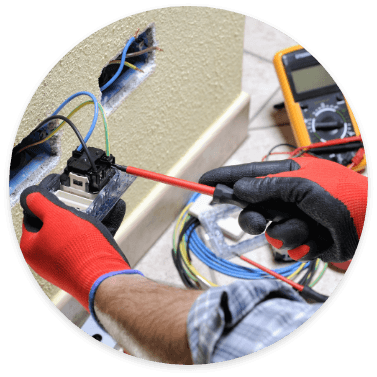Frequently Asked Questions
How do I know if my home needs rewiring?
Signs that your home may need rewiring include frequently tripped circuit breakers, flickering lights, outdated wiring materials, or the presence of ungrounded outlets. It’s best to have a professional electrician assess your home’s wiring to determine if rewiring is necessary.
Is rewiring a house a DIY project?
Rewiring a house is a complex and potentially hazardous task that should be left to licensed and experienced electricians. Attempting to DIY electrical rewiring can lead to safety hazards, code violations, and costly mistakes.
How long does it take to rewire a house?
The duration of a house rewiring project can vary depending on factors such as the size of the house, the complexity of the existing wiring, and any additional electrical upgrades required. On average, rewiring a house may take anywhere from several days to a few weeks to complete.
Will rewiring my house increase its value?
Upgrading the electrical wiring in your home can increase its value by enhancing safety, energy efficiency, and functionality. Potential buyers may see updated wiring as a significant selling point, especially in older homes where outdated wiring poses safety risks.
What types of wiring materials are used in rewiring?
Modern rewiring projects typically use materials such as copper or aluminum wiring, which are known for their durability and conductivity. Older homes may have outdated wiring materials such as knob-and-tube or aluminum wiring, which may require replacement.
Can rewiring my house lower my energy bills?
Yes, rewiring your house with modern, energy-efficient wiring and components can help reduce energy consumption and lower your utility bills. Upgraded wiring can optimize the efficiency of your electrical system and support the use of energy-efficient appliances.
Will rewiring my house disrupt my daily activities?
While rewiring a house may involve some temporary disruptions to electrical service and access to certain areas of the home, experienced electricians strive to minimize inconvenience to homeowners. They may schedule work during off-peak hours and provide temporary solutions to maintain essential power.
Can I add additional outlets during the rewiring process?
Yes, the rewiring process presents an opportunity to add additional outlets or upgrade existing outlets to meet your household’s needs. Electricians can work with you to design a customized electrical layout that includes optimal outlet placement for convenience and functionality.
Is rewiring covered by homeowners insurance?
Homeowners insurance policies typically do not cover the cost of rewiring a house unless the rewiring is required due to a covered peril, such as fire or storm damage. It’s advisable to review your insurance policy and consult with your insurance provider to understand your coverage options.
What are the signs that my home’s wiring needs to be replaced?
Common signs that indicate your home’s wiring may need replacement include frequently blown fuses or tripped circuit breakers, burning odors coming from outlets or switches, sparks when plugging in appliances, and outdated two-prong outlets.
How often should I have my home’s wiring inspected?
It’s recommended to have your home’s wiring inspected by a qualified electrician every 10 to 15 years, or sooner if you notice any signs of electrical problems. Regular inspections can help identify potential issues early and prevent safety hazards.
Can I upgrade my home’s wiring without tearing down walls?
Yes, in many cases, electricians can upgrade a home’s wiring without the need for extensive wall demolition. Techniques such as fishing wires through existing conduit or using cable tracks may allow for wiring upgrades with minimal disruption to walls.
Is aluminum wiring safe, or should it be replaced?
Aluminum wiring, commonly used in homes built in the 1960s and 1970s, can pose fire hazards due to its tendency to expand and contract with temperature changes. It’s generally recommended to replace aluminum wiring with copper wiring to improve safety.
How much does it cost to rewire a house?
The cost of rewiring a house can vary depending on factors such as the size of the home, the complexity of the existing wiring, accessibility of wiring areas, and any additional electrical upgrades required. On average, rewiring a house may cost several thousand dollars.
Will rewiring my house require me to upgrade my electrical panel?
In some cases, rewiring a house may necessitate upgrading the electrical panel to accommodate the increased electrical load. An electrician can assess your current panel and recommend any necessary upgrades to ensure compatibility with the new wiring.
Can I DIY electrical rewiring?
Electrical rewiring is a complex and potentially dangerous task that should only be performed by licensed and experienced electricians. Attempting to DIY electrical rewiring without proper knowledge and training can lead to serious safety hazards and code violations.
How can I ensure that my home’s wiring meets current safety standards?
To ensure that your home’s wiring meets current safety standards, it’s essential to hire a licensed electrician who is knowledgeable about local building codes and regulations. The electrician can assess your wiring, make any necessary upgrades, and ensure compliance with safety standards.
What are the benefits of rewiring my home?
Rewiring your home offers several benefits, including improved safety by reducing the risk of electrical fires, enhanced functionality to support modern appliances and electronics, increased energy efficiency, and potentially higher property value.
How long does rewiring a house typically take?
The duration of a house rewiring project depends on factors such as the size of the home, the extent of the wiring replacement, and any additional electrical work required. On average, rewiring a house may take several days to a few weeks to complete.



